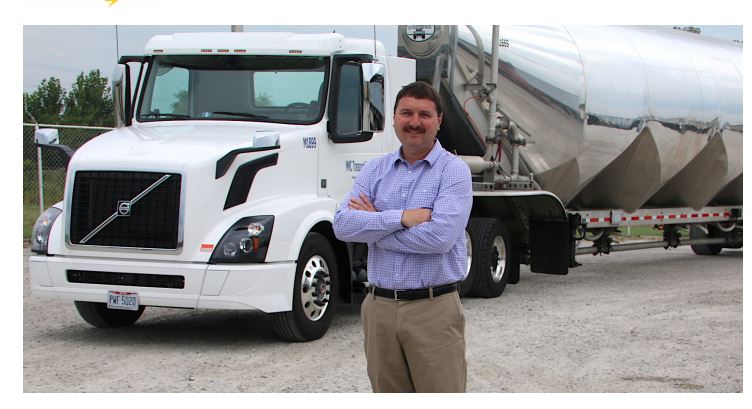Flour Power
The Mennel Milling Co. continues a long tradition in flour production as one of the oldest flour mills in the country, The Mennel Milling Co. in Fostoria, Ohio, has seen a lot of change over the years. But one thing remains consistent: family ownership. CEO D. Ford Mennel represents the fifth generation of the company, which was started in 1886. To put that into perspective, that year Grover Cleveland was president and the Statue of Liberty was dedicated in New York City.
Mennel Milling’s five mills in Ohio, Michigan, Illinois, and Virginia produce more than 200 different types of flour per day and the company has over 2,000 products in its catalog. For deliveries, Mennel Milling has a fleet of 70 daycab tractors—a mix of mostly Mack, Volvo, Kenworth, and Internationals. More than 65 percent of its shipments utilize 1,550- to 2,000-cubic-foot pneumatic trailers, with Stevens, Polar, Tremcar, and Vantage being the trailers of choice. Mennel Milling also uses van trailers to move flour packaged wear, the company has been spec’ing its pneumatic trailers with super-single tires to save weight for many years. Additionally, the trailers have liftable axles.
“Since half our miles are empty, we can reduce our parasitic drag by lifting one axle when we’re not loaded,” Decker said. “Plus we’ll save some tire wear.”

BOLT helps Mennel Milling manage activity-based pay, a streamlined system that benefits both the fleet and its drivers.
The company also specs disc brakes on the trailers and tractors, a practice that started in 2012.
Solving Puzzles
Routing at Mennel Milling is dynamic. “Some customers know exactly what they need two to three weeks in advance, so those runs are easier to schedule,” said Decker. “Many others change their needs daily. Our BOLT fleet management program helps us tremendously in routing and dispatch.”
Since working with BOLT, Mennel Milling has implemented activity-based pay for its drivers, many whom have been with the company for 30 or more years. “Dispatch and pay were like a jigsaw puzzle without a box top for guidance,” Decker recalled. “We had originally gone with the 800-pound gorilla in a fleet management program but it was expensive and offered platforms we didn’t need or use but still paid for. Plus, it wasn’t flexible for our needs. BOLT System is less complex, is tailored for our needs, and saves us time and money.” Mennel Milling pays drivers in “segments,” with information easily plugged into the company’s PeopleNet ELD (geo-fencing at mills allows for faster input). Pay can be broken out per mile, on longer trips for example, or it can have a flat load rate. Plus, loading can have a pay structure which can include a self-load fee at the mill.
Even the time of day can come into play.
“If, for example, a delivery is made after midnight on a Friday, a multiplier can kick in to assign additional value,” said Decker. “There are a lot of moving parts with our structure and we like how BOLT makes it easy and eliminates extra paperwork and tracking on our end. Our drivers like it, too. Pay is transparent and they save time every week because theyin 50-pound bags all the way up to “Super Sacks,” or 1,600-pound totes. Hopper trailers bring wheat from grain elevators to Mennel flour mills, then return to processing plants with “midds,” the portion of a wheat berry that is commonly used for feed ingredients.
According to Jeremy Decker, transportation safety manager at Mennel Milling, dense loads like bread flour can be shipped in the 1,550-cubic-foot trailers while lighter loads like cake flour can fill a 2,000-cubic-foot pneumatic trailer. Vehicles typically gross out at 80,000 pounds and deliveries are normally single shipments to one customer, typically a bakery or mixing plant.
“We primarily cover the eastern half of the U.S. and some trucks will make two to three runs per day,” said Decker, who is a CTP (NPTC Certified Transportation Professional). “We do have longer runs that will take a truck 500 or more miles outside one of our mills.” To gain better fuel economy and reduce tire no longer have to manually record their duty status.”
A Never-ending Process
According to Jerry Robertson, chief technology officer for BOLT System, developing a fleet management program is a never-ending process. “The trucking industry is ever-changing,” he said. “We’re changing as well by building activity-based pay portals into our management system. There is huge upside for fleets and drivers. We expect a sea-change in how drivers are paid.”
It’s already happening with BOLT customers like Mennel Milling, which can identify different driver activities and assign pay to each task. “With the system we’ve set up, we can easily help customers document their work flow, with various pay standards, and streamline it into payroll,” Robertson said. “Fleet managers are happy since they can bill shippers for all services delivered, and drivers are happy since they’re paid for each of their activities. The primary pay factors are miles, stops, and hours—it’s difficult to quantify hours, and that’s the key target for activity-based pay.” Not all management systems can capture hours and activities, said Robertson, “but it’s important, especially now since California is requiring this type of information.” There are literally dozens of activities that can easily be inputted and set up for tracking. “We do it all the time for our customers,” he said, “and it’s a great help for them to understand the different activities their drivers encounter.”

